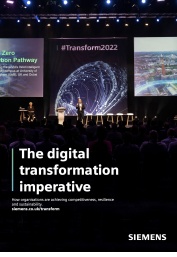Hoarding digital experience risks holding back progress

Outdated attitudes to sharing knowledge risks holding back progress on sustainability and resilience in UK industry, according to a new report by Siemens.
The study, The Digital Transformation Imperative, explores how businesses can overcome major challenges with the help of digitalisation – and the barriers organisations face in accelerating their deployment of new technologies.
The report found that more collaboration is needed across sectors like utilities, engineering and manufacturing, as firms look to their peers to understand how they can meet ambitions like net zero with the help of digital tools.
According to the study, the Government, trade bodies and strategic technology partner networks have critical roles to play in enabling collaboration without exposing competitive intelligence.
Brian Holliday, Managing Director at Siemens Digital Industries, said: “Businesses are naturally protective of any competitive advantages they create. But digital transformation represents something much bigger than an opportunity for incremental market gains.
“To accelerate progress, industries need to pool their experiences with digital transformation, and how individual companies have succeeded in protecting themselves against future shocks or working towards major goals like net zero.
“Siemens Xcelerator is designed to increase the accessibility of digital transformation, to inspire and facilitate change within businesses. While public sector bodies and trade associations also have a pivotal role in disseminating success stories and new concepts.”
Skills are also highlighted in the report as another key barrier to progress. It outlines how a better interface between industry and education is needed to improve skills development for digital transformation, with people remaining a critical factor for its success.
Speaking in the report, Stephen Phipson, CEO at Make UK, said: “The first steps to transformation aren’t about technology, but people. For SMEs, this needs to be driven by leadership and investment in training for staff to be able to cope with the change.”
The Digital Transformation Imperative addresses how technology available today could be deployed more widely by firms to achieve their goals. For example, monitors, sensors, energy use metering and data analytics can be used more widely to digitise physical environments. Meanwhile, digital twin technology could be used more to help firms simulate ideas and concepts.
Carl Ennis, CEO at Siemens UK and Ireland, added: “The significant impact of COVID-19 on our industries, coupled with additional energy and inflationary pressures at the fore, have accelerated rapid transformation in leading organisations at an unprecedented scale.
“The influential role that digital transformation has in enabling sustainable and resilient business is clearly recognised by industry and public sector leaders. Yet our report finds how lack of collaboration, skills and investment represent top barriers in achieving these goals.”
The launch of the report follows Siemens convening more than 2,000 industry, governmental and economic thought leaders at its inaugural Transform event last year.
Industry leaders lending their voice to the report include engineering group Arup, and utilities giant Irish Water. Contributions from leading public sector figures and trade bodies include Mayor of Greater Manchester Andy Burnham, the CBI’s chief policy director, and the Vice Chair at the Northern Powerhouse Partnership, who also give their views for the report.
To read the full report, visit: www.siemens.com/transform-report
Back to Latest News




3.png&w=170&h=170)


2.jpg&w=170&h=170)
1.png&w=170&h=170)



